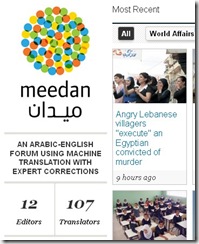Friday, April 30, 2010
Collaborative news project bridges Arabic-English language and culture barriers
by Larry Geller
Another collaborative website with very civil conversations—this one bridging the language an culture gaps between Arabic and English speakers in a unique way, bringing people together who may often be at odds. The website brings ordinary people together using machine and human assisted translation even as their governments fight deadly wars. (Thanks to On The Media for their discussion of this project on this week’s program.)
Meedan hosts news and conversations on world affairs, culture, business and technology assisted by machine translations and volunteer translators.
If someone in the Mid-East writes in Arabic, they reach the local audience but lose the larger number of English-speaking web readers. If they write in English for the world audience, they won’t be read in their own neighborhood. Meedan provides the solution and brings people together in either language.
By using a grey background the original language is identified, with the other alongside. It works really well. Visit their website and poke around.
About Meedan
The Arabic word 'meedan' - ميدان – means 'a town square' or 'gathering place.'
Meedan.net is a digital town square where you can share conversation and links about world events with speakers outside your language community. Everything that gets posted on meedan.net is mirrored in Arabic and English – whether it’s the headlines you read, the comments you write, or the articles you share.
Snipping just a bit more, you’ll see why this site fills a great need:
Why Meedan?
The events of September 11 and the ongoing crisis in the Middle East have highlighted the need for greater dialogue among the Arabic-speaking world, the U.S. and Western Europe.
In the West, there is limited understanding of the diversity of the Muslim world.
More concerning, levels of distrust are high. Nearly a quarter of Americans (22%) say they would not like a Muslim as a neighbor according to recent polls.
Within the Arabic-speaking world, distrust and misperceptions of the West, including the West’s foreign policy aims, run high.
Significantly though, this negative view does not translate to isolationist sentiments.
A Zogby Poll found that more than 70% of Moroccans, Jordanians and Lebanese responded that they would "like to know" an American citizen.
With 1.3 billion Internet users worldwide, and 40 million Arabic speakers on the Internet, the social potential for the web to play a key role in the solution seems apparent, though untested.
Their bilingual tweets @meedan are a great source of news also.
As you see, I’m trying to highlight experiments in on-line collaboration, inspired by Peer News and their paywall. That’s one model, and more power to it. I’m already better educated from merely visiting Meedan, and its conversations are very, very civil, and open to all.
Hey Larry, can't believe I missed this post when u put it up. Really nice of you to cover Meedan- thanks for the kind words and glad that you like what we are trying to do.
Salam,
Ed (Ed from Meedan)
<< Home




Post a Comment
Requiring those Captcha codes at least temporarily, in the hopes that it quells the flood of comment spam I've been receiving.